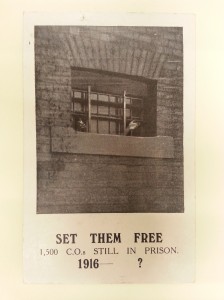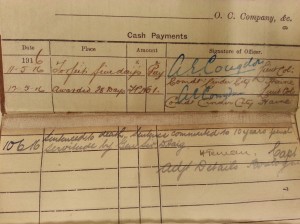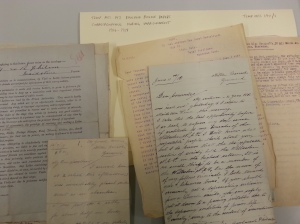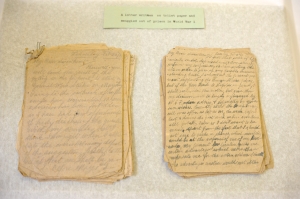Some of the Library’s rarest printed items are ephemeral publications, pamphlets, broadsides and single sheet circulars, ranging from the 17th century to the present day. Their survival is unusual, and owes much to the way they have been stored, often bound together into guard books or tract volumes. These bindings keep the contents relatively flat, clean and dry, but present their own problems. A variety of differently sized items bound together, sometimes folded up to fit within the volume, can be vulnerable to dust, damage to protruding pages and tearing at folded edges when they are opened out for use.
One of these tract volumes is – no, was – volume H, a four inch thick binding of 225 mainly late 18th to 19th century items.

Tract vol. H, uncased. Photograph from the conservator.
The volume was bound in 1951 to accommodate 225 separate publications – reports, posters, newspaper cuttings – of different sizes. Very large sheets had been slit in two and each leaf pasted to a guard. Some items were directly sewn into the binding, others folded and sewn. With regular use by readers, new folds had been made and new sequences of folds attempted. Unfolding had become like solving a puzzle in an effort to prevent further tears along the weakened folds and crossings. Although the volume had a protective slip-case, London’s sooty dust could be seen not only on the irregular top edges but drifting down between the individual sheets too.
What kept researchers coming back to this volume was its contents. The spine read: “Tracts H – On slavery. The War Victims &c.”, and these miscellaneous contents included reports of the Friends War Victims Fund on the Franco-Prussian War of 1870/1, reports of the relief work Quakers carried out in Nantes, appeals for funds for child war victims in Eastern Europe (1876), and a tri-lingual poster for the Quaker Relief Fund for Distressed Peasantry.

War Victims Fund poster. Photograph from the conservator after disbinding and before unfolding and conservation
Ref.: Vol. H/38
Among the slavery related publications were multiple issues of the British and Foreign Anti-Slavery Reporter of 1844, and surviving circulars from a wide range of anti-slavery organisations – local anti-slavery committees in Nottingham, Bradford, and Settle, the Society of Sierra Leone and the Quaker inspired Society for the Abolition of the Slave Trade, the first such committee.

The epistle of the Society of Sierra Leone, in Africa : to the saints and faithful brethren in Christ [etc.] (1811)
Ref. Vol. H/75

East India sugar basins. B Henderson, china-warehouse, Rye-Lane, Peckham. – [London] Printed at the Camberwell Press, by J.B.G. Vogel [ca. 1828]
Ref.: Vol. H/22

Plymouth Society for the Abolition of Slavery. Plan of an African slave ship’s lower deck
(Plymouth : Trewman and Haydon, printers, [1789?])
Ref.: Vol. H/85
So what has become of Volume H?
Using funds from the BeFriend a Book appeal fund, this tired volume was finally dispatched to a conservator for full dis-binding and repair of the contents. After separation of each component item, the surface dirt was carefully removed, the dog-ears and creases eased away, and the tears and small paper losses made good with Japanese papers and wheat starch paste. Items which had been tipped, or glued together were separated, and the folded items flattened.
The separate items previously bound together are now individually stored in protective transparent sleeves and securely housed in appropriate sized boxes. Researchers can now examine the extraordinary slave ship plan published by the Plymouth Society for the Abolition of Slavery, or the plan of the Spanish schooner Josefa Maracayera, without dread of tearing – cleaned, repaired and far easier to handle.

Cross section plan of a slave ship
[Plan of] the Spanish schooner, Josefa Maracayera of 90 tons, 21 seamen, belonging to the Havannah, captured by the Driver, Capt. Wolrige, in the Bight of Benin, on the coast of Africa, on the 19th of 8th mo. (Aug.) 1822 with 216 male slaves on board (London : printed under the direction of a Committee of the Society of Friends appointed to aid in promoting the total abolition of the slave-trade, 1822)
Ref.: Vol. H/161
Filed under: Collection care











































































































































